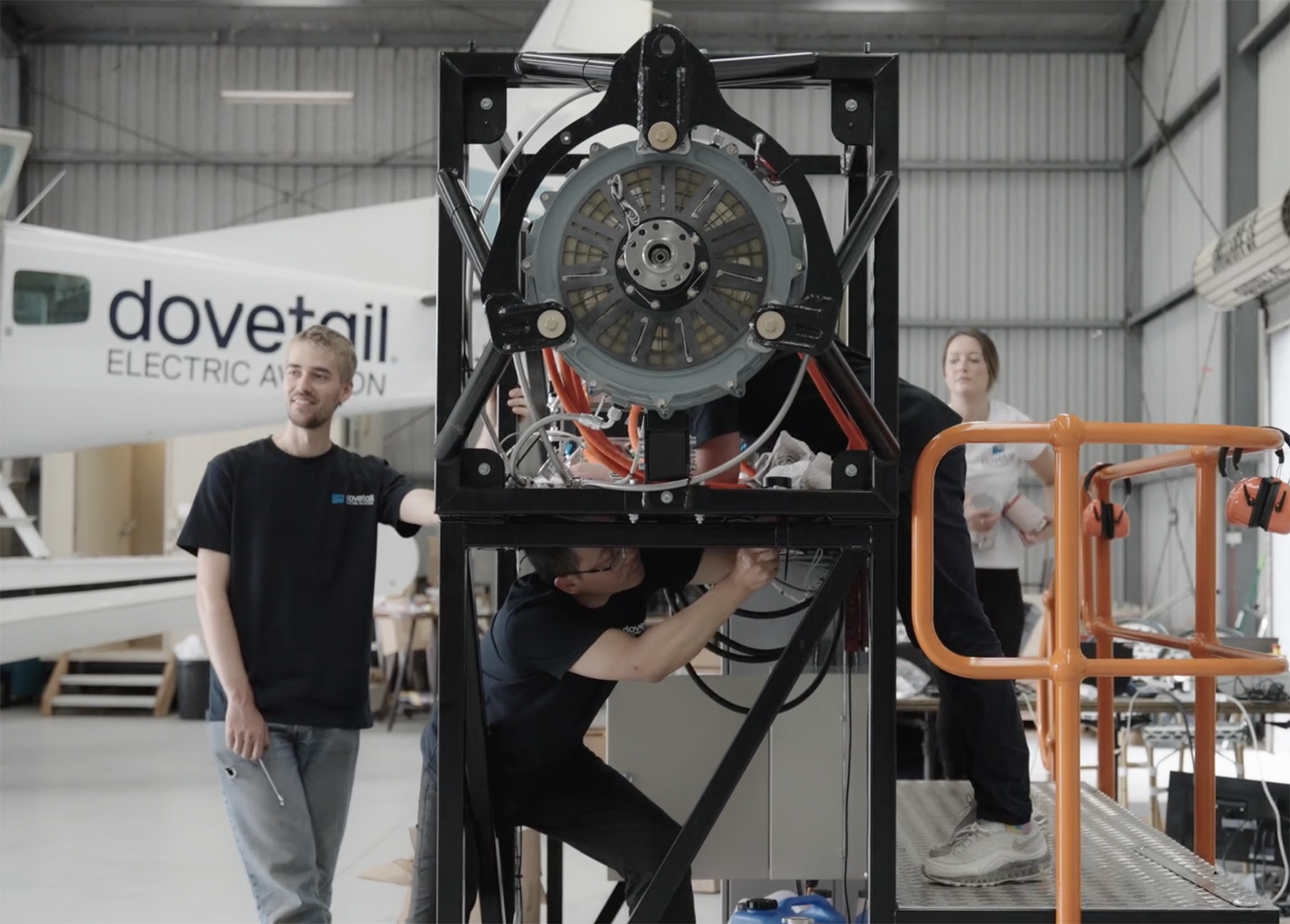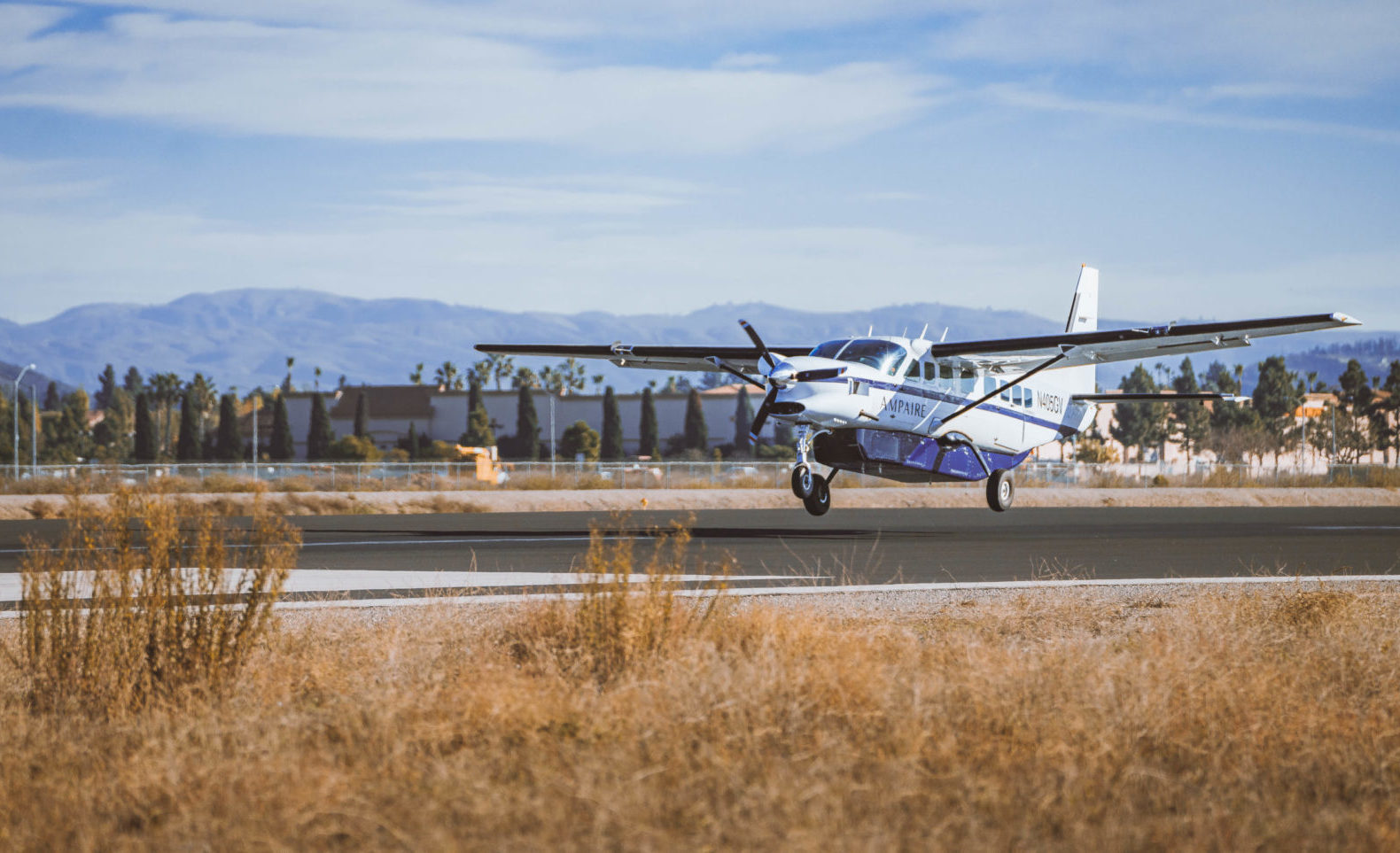Stay Up to Date
Submit your email address to receive the latest industry and Aerospace America news.
Plans by two companies to retrofit Cessna Caravans, the venerable cargo and passenger aircraft, into fully or partially electrified versions have solidified in recent weeks on the technology and business fronts.
Dovetail Electric Aviation of Australia has completed initial ground testing of a scaled-down version of the electric motor and propeller it plans to install in a Caravan to turn the aircraft into an all-electric version for flight testing later this year, the company announced Feb. 28.
The components were operated on a subscale “iron bird” test stand. A three-blade propeller was spun by a 250-kilowatt motor, the magni250 prototype, manufactured by magniX of Everett, Washington.
Dovetail calls this half-scale version of the planned DTX electric propulsion system the DTX0.5. Testing it was “a significant feat because it shows that we’re capable of making all these different components work and even developing our own technology when there are gaps in what we can find in the market,” Dovetail co-founder and CEO David Doral told me in an interview.
In the next ground testing of the magni250 motor and tests later this year with the more powerful magni650, Dovetail will evaluate the performance of electric car batteries, including the rechargeable 21700 lithium-ion battery and newer batteries being developed for the aviation market. The company also has in mind hydrogen fuel cell technology as a longer-term solution, because hydrogen could extend aircraft performance and range.
Doral said that powering Caravans with batteries will lower operating costs by 40% and bring emissions from the airframe down to zero.
Data from the iron bird tests are needed for Dovetail’s application for flight certification of retrofitted Cessna Caravans from Australia’s Civil Aviation Safety Authority and the European Union Aviation Safety Agency. With a goal of certifying the Caravans in 2025, Dovetail is setting up a facility in Australia with Spain’s Dante Aeronautical, which Doral also founded, to retrofit some 50 turboprops annually. Sydney Seaplanes and Dante Aeronautical formed Dovetail as a joint venture in 2021.
Dovetail isn’t alone in seeing a market for retrofitted Caravans.
California-based Ampaire in January received a signed letter of intent from Azul Conecta, a Brazilian airline, for the purchase of retrofit kits to convert up to six of its 27 Caravans into hybrids. That came after the start of test flights in November and the award days later of a $9 million grant from the U.S. Advanced Research Projects Agency-Energy. Ampaire also plans to do its own conversions into Eco Caravans and begin delivering those aircraft in 2024. London-based aircraft financier Monte has ordered 25 Eco Caravans, with an option to purchase another 25.
To make an Eco Caravan, the existing Pratt and Whitney PT6A turboprop engine is replaced with a turbodiesel engine from Germany’s Red Aircraft. This engine is then paired with Ampaire’s AMP-H570 electric motor, which is powered by a battery pack in the cargo pod.
Ampaire says the Eco Caravan promises to reduce operating costs by at least 25% and lower emissions. “At the end of the day, by burning half as much fuel, you have half the emissions in the environment,” the company’s co-founder and CEO, Kevin Noertker, told me.
Plus, the hybrid approach “de-risks almost every aspect of the new technology,” Noertker said. If the electric system fails, the airplane can cruise and land on combustion power. Similarly, if a flight is diverted, the Eco Caravan can touch down at another airport because, like a Toyota Prius, it requires no charging infrastructure.
Government and private funding is flowing to Dovetail as well. Among the investors are airlines Air Nostrum and Volotea of Spain and Australia’s Regional Express. Dovetail was awarded a 3 million Australian dollar ($2 million) research grant in January from Australia’s Industry and Science Department for developing electric aircraft retrofit technology. South Korean startup MintAir has ordered up to 10 electric aircraft from Dovetail.
Dovetail plans to unveil its electric propulsion system during the Australian International Airshow March 3-5. Also at the airshow, Sydney Seaplanes plans to display the first Caravan that Dovetail will convert to electric power.
About Debra Werner
A longtime contributor to Aerospace America, Debra is also a correspondent for Space News on the West Coast of the United States.
Related Posts
Stay Up to Date
Submit your email address to receive the latest industry and Aerospace America news.





